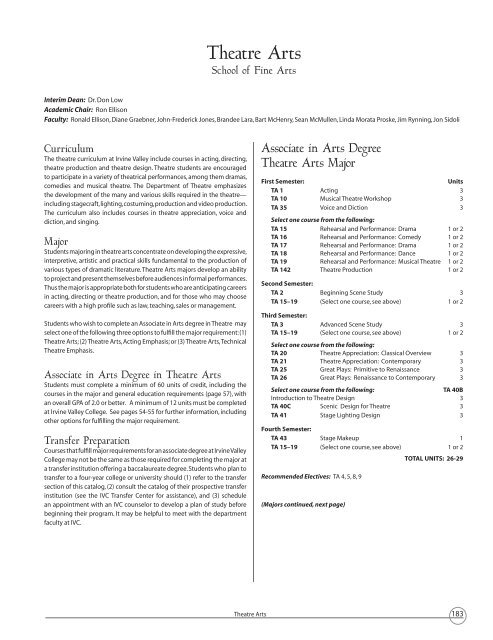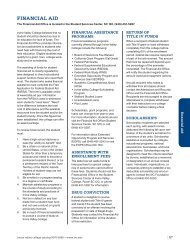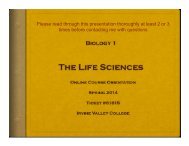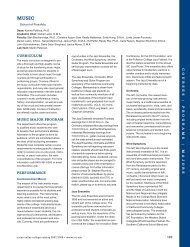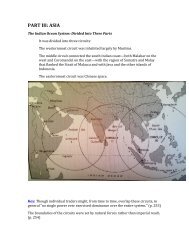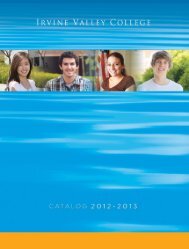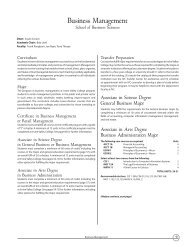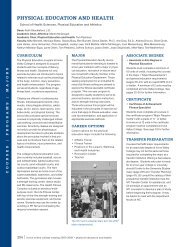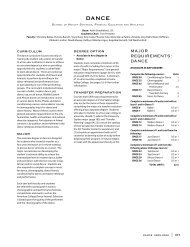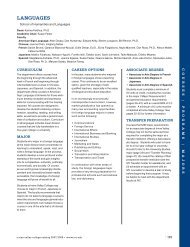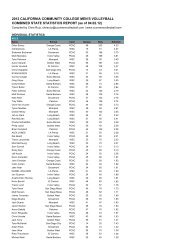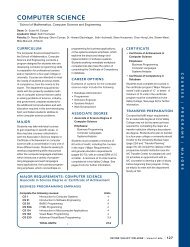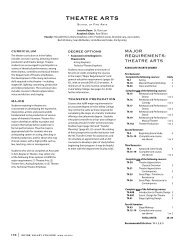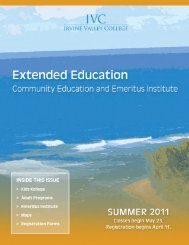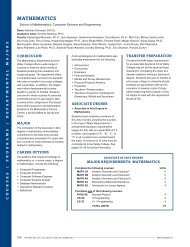ta - Irvine Valley College
ta - Irvine Valley College
ta - Irvine Valley College
Create successful ePaper yourself
Turn your PDF publications into a flip-book with our unique Google optimized e-Paper software.
Theatre Arts<br />
School of Fine Arts<br />
Interim Dean: Dr. Don Low<br />
Academic Chair: Ron Ellison<br />
Faculty: Ronald Ellison, Diane Graebner, John-Frederick Jones, Brandee Lara, Bart McHenry, Sean McMullen, Linda Mora<strong>ta</strong> Proske, Jim Rynning, Jon Sidoli<br />
Curriculum<br />
The theatre curriculum at <strong>Irvine</strong> <strong>Valley</strong> include courses in acting, directing,<br />
theatre production and theatre design. Theatre students are encouraged<br />
to participate in a variety of theatrical performances, among them dramas,<br />
comedies and musical theatre. The Department of Theatre emphasizes<br />
the development of the many and various skills required in the theatre—<br />
including s<strong>ta</strong>gecraft, lighting, costuming, production and video production.<br />
The curriculum also includes courses in theatre appreciation, voice and<br />
diction, and singing.<br />
Major<br />
Students majoring in theatre arts concentrate on developing the expressive,<br />
interpretive, artistic and practical skills fundamen<strong>ta</strong>l to the production of<br />
various types of dramatic literature. Theatre Arts majors develop an ability<br />
to project and present themselves before audiences in formal performances.<br />
Thus the major is appropriate both for students who are anticipating careers<br />
in acting, directing or theatre production, and for those who may choose<br />
careers with a high profile such as law, teaching, sales or management.<br />
Students who wish to complete an Associate in Arts degree in Theatre may<br />
select one of the following three options to fulfill the major requirement: (1)<br />
Theatre Arts; (2) Theatre Arts, Acting Emphasis; or (3) Theatre Arts, Technical<br />
Theatre Emphasis.<br />
Associate in Arts Degree in Theatre Arts<br />
Students must complete a minimum of 60 units of credit, including the<br />
courses in the major and general education requirements (page 57), with<br />
an overall GPA of 2.0 or better. A minimum of 12 units must be completed<br />
at <strong>Irvine</strong> <strong>Valley</strong> <strong>College</strong>. See pages 54-55 for further information, including<br />
other options for fulfilling the major requirement.<br />
Transfer Preparation<br />
Courses that fulfill major requirements for an associate degree at <strong>Irvine</strong> <strong>Valley</strong><br />
<strong>College</strong> may not be the same as those required for completing the major at<br />
a transfer institution offering a baccalaureate degree. Students who plan to<br />
transfer to a four-year college or university should (1) refer to the transfer<br />
section of this ca<strong>ta</strong>log, (2) consult the ca<strong>ta</strong>log of their prospective transfer<br />
institution (see the IVC Transfer Center for assis<strong>ta</strong>nce), and (3) schedule<br />
an appointment with an IVC counselor to develop a plan of study before<br />
beginning their program. It may be helpful to meet with the department<br />
faculty at IVC.<br />
Associate in Arts Degree<br />
Theatre Arts Major<br />
First Semester:<br />
Units<br />
TA 1 Acting 3<br />
TA 10 Musical Theatre Workshop 3<br />
TA 35 Voice and Diction 3<br />
Select one course from the following:<br />
TA 15 Rehearsal and Performance: Drama 1 or 2<br />
TA 16 Rehearsal and Performance: Comedy 1 or 2<br />
TA 17 Rehearsal and Performance: Drama 1 or 2<br />
TA 18 Rehearsal and Performance: Dance 1 or 2<br />
TA 19 Rehearsal and Performance: Musical Theatre 1 or 2<br />
TA 142 Theatre Production 1 or 2<br />
Second Semester:<br />
TA 2 Beginning Scene Study 3<br />
TA 15–19 (Select one course, see above) 1 or 2<br />
Third Semester:<br />
TA 3 Advanced Scene Study 3<br />
TA 15–19 (Select one course, see above) 1 or 2<br />
Select one course from the following:<br />
TA 20 Theatre Appreciation: Classical Overview 3<br />
TA 21 Theatre Appreciation: Contemporary 3<br />
TA 25 Great Plays: Primitive to Renaissance 3<br />
TA 26 Great Plays: Renaissance to Contemporary 3<br />
Select one course from the following:<br />
TA 40B<br />
Introduction to Theatre Design 3<br />
TA 40C Scenic Design for Theatre 3<br />
TA 41 S<strong>ta</strong>ge Lighting Design 3<br />
Fourth Semester:<br />
TA 43 S<strong>ta</strong>ge Makeup 1<br />
TA 15–19 (Select one course, see above) 1 or 2<br />
Recommended Electives: TA 4, 5, 8, 9<br />
(Majors continued, next page)<br />
TOTAL UNITS: 26-29<br />
Theatre Arts 183
ACTI NG EMPHASIS<br />
Complete these courses:<br />
Units<br />
TA 1 Acting 3<br />
TA 2 Beginning Scene Study 3<br />
Select 3 units from these courses:<br />
TA 3 Advanced Scene Study 3<br />
TA 4 Acting Styles: Classical 3<br />
TA 5 Acting Styles: Contemporary 3<br />
Select 3 units from these courses:<br />
TA 15 Rehearsal and Performance: Drama 1 or 2<br />
TA 16 Rehearsal and Performance: Comedy 1 or 2<br />
TA 17 Rehearsal and Performance: Drama 1 or 2<br />
TA 18 Rehearsal and Performance: Dance 1 or 2<br />
TA 19 Rehearsal and Performance: Musical Theatre 1 or 2<br />
TA 241 <strong>Irvine</strong> <strong>Valley</strong> <strong>College</strong> Conservatory 1 or 2<br />
Select 3 units from these courses:<br />
TA 20 Theatre Appreciation: Classical Overview 3<br />
TA 25 Great Plays: Primitive to Renaissance 3<br />
TA 26 Great Plays: Renaissance to Contemporary 3<br />
TA 28 History of Musical Theatre: The Rock Musical 3<br />
Select 3 units from these courses:<br />
TA 40B Introduction to Theatre Design 3<br />
TA 40C Scenic Design for Theatre 3<br />
TA 41 S<strong>ta</strong>ge Lighting Design 3<br />
TA 42 Costume Design 3<br />
TA 43 S<strong>ta</strong>ge Makeup 1<br />
TA 142 Theatre Production 1 or 2<br />
TOTAL UNITS: 18<br />
Recommended Electives: TA 4, 5, 8, 10, 20<br />
TEC HNICA L THEATRE EMPHASIS<br />
Complete this course:<br />
Units<br />
TA 1 Acting 3<br />
Select 3 units from these courses:<br />
TA 15 Rehearsal and Performance: Drama 1 or 2<br />
TA 16 Rehearsal and Performance: Comedy 1 or 2<br />
TA 17 Rehearsal and Performance: Drama 1 or 2<br />
TA 18 Rehearsal and Performance: Dance 1 or 2<br />
TA 19 Rehearsal and Performance: Musical Theatre 1 or 2<br />
TA 241 <strong>Irvine</strong> <strong>Valley</strong> <strong>College</strong> Conservatory 1 or 2<br />
Select 3 units from these courses:<br />
TA 20 Theatre Appreciation: Classical Overview 3<br />
TA 25 Great Plays: Primitive to Renaissance 3<br />
TA 26 Great Plays: Renaissance to Contemporary 3<br />
TA 28 History of Musical Theatre: The Rock Musical 3<br />
Select 9 units from these courses:<br />
TA 40B Introduction to Theatre Design 3<br />
TA 40C Scenic Design for Theatre 3<br />
TA 41 S<strong>ta</strong>ge Lighting Design 3<br />
TA 42 Costume Design 3<br />
TA 43 S<strong>ta</strong>ge Makeup 1<br />
TA 142 Theatre Production 1 or 2<br />
TOTAL UNITS: 18<br />
Recommended Electives: TA 10, 12, 20<br />
Courses<br />
Theatre Appreciation and History<br />
TA 20: Theatre Appreciation: Classical Overview<br />
3 Units<br />
3 hours lecture<br />
This course examines theatre history, the role of the actor and director, and<br />
exemplary plays from the ancient Greek through the 19th century. Students<br />
may be required to attend scheduled field trips to community and professional<br />
theatre performances, and to evaluate and critique productions. NR<br />
TA 21: Theatre Appreciation: Contemporary<br />
3 Units<br />
3 hours lecture<br />
This course studies impor<strong>ta</strong>nt playwrights, genres, and technical aspects<br />
of 20th century, 21st century, and contemporary theatre. Students may be<br />
required to attend scheduled field trips to community and professional theatre<br />
performances, and to evaluate and critique productions. NR<br />
TA 25: Great Plays: Primitive to Renaissance<br />
3 Units<br />
3 hours lecture<br />
Theatre Arts 25 is a reading and discussion course designed to study significant<br />
plays from the major eras of world drama. The course traces the development<br />
of the playscript in themes, characterization, and dramatic structure from<br />
primitive ritual through the works of the great playwrights of Greece, Rome,<br />
and medieval and Renaissance Europe. The course considers philosophical and<br />
cultural backgrounds and production styles which have influenced the s<strong>ta</strong>ging<br />
of plays. Field trips may be required. NR<br />
TA 26: Great Plays: Renaissance to Contemporary<br />
3 Units<br />
3 hours lecture<br />
Theatre Arts 26 is a reading and discussion course designed to study significant<br />
plays selected from the major forms of world drama since the Renaissance.<br />
The course explores themes, characterization, and philosophical and cultural<br />
influences on the content and production styles of plays. Field trips may be<br />
required. NR<br />
TA 28: History of Musical Theatre: The Rock Musical<br />
3 Units<br />
3 hours lecture<br />
This course examines patterns and traditions of various theatre cultures of<br />
the world, including Africa, Asia, and the Americas, which have influenced and<br />
contributed to the development of the musical as a genre (including its pop,<br />
rock, jazz, and blues styles). The course investigates the social and political<br />
aspects of the genre’s evolution. Attendance at live performances may be<br />
required. NR<br />
184 <strong>Irvine</strong> <strong>Valley</strong> <strong>College</strong> Ca<strong>ta</strong>log 2003–2004
Theatre (Acting)<br />
TA 1: Acting<br />
3 Units<br />
2 hours lecture, 3 hours lab<br />
This course addresses traditional techniques, theories and philosophies of<br />
acting. Students work on the physical aspects of the art, including voice<br />
development, breathing and relaxation techniques, and kinetics, as well as the<br />
creative aspects. Improvisation, scene study, character development, and text<br />
analysis are central to the course. (CAN DRAM 8) NR<br />
TA 2: Beginning Scene Study<br />
3 Units<br />
2 hours lecture, 3 hours lab<br />
Corequisite: TA 40B, 41, 42, 43, 142 or 241.<br />
This course continues the emphasis of Theatre Arts 1. Students concentrate<br />
on scene study, characterization, and ensemble performance, working toward<br />
realizing a method of approach. NR<br />
TA 3: Advanced Scene Study<br />
3 Units<br />
2 hours lecture, 3 hours lab<br />
Corequisite: TA 40B, 41, 42, 43, 142 or 241.<br />
This course continues the emphasis of Theatre Arts 2. Students focus primarily<br />
upon scene study, performing scenes from the plays of Ibsen, Chekhov, and<br />
Pinter. Students may also perform in student-directed one-act plays. NR<br />
TA 4: Acting Styles: Classical<br />
3 Units<br />
2 hours lecture, 3 hours lab<br />
Corequisite: TA 40B, 41, 42, 43, 142, or 241.<br />
This is a course devoted to the actor’s problems in performing period styles,<br />
with an emphasis on the classic Greek and Elizabethan. NR<br />
TA 5: Acting Styles: Contemporary<br />
3 Units<br />
2 hours lecture, 3 hours lab<br />
Corequisite: TA 40B, 41, 42, 43, 142, or 241.<br />
This is a course devoted to the actor’s problems in performing contemporary<br />
styles from absurdism to the present. NR<br />
TA 7: Screen Acting Techniques<br />
3 Units<br />
2 hours lecture, 3 hours lab<br />
This course explores the principles and techniques of various performance<br />
methods involved in acting for television and motion pictures. The course<br />
includes directed exercises and dramatic scenes. R-E-3<br />
TA 8: Advanced Acting<br />
3 Units<br />
3 hours lecture<br />
This is an advanced course in acting designed for students who will not be<br />
<strong>ta</strong>king the concurrent courses associated with Theatre Arts 1. The course<br />
focuses especially on text analysis and character development, and students<br />
concentrate on exploring and developing their creative abilities in these areas.<br />
R-E-3<br />
TA 35: Voice and Diction<br />
3 Units<br />
3 hours lecture<br />
In this course students study the principles and practices of vocal and<br />
articulatory development and control. The course provides drills in phonation<br />
and drills for clarity and ease in articulation; and students practice resonance<br />
and vocal variety. This course is also listed as Speech 35; credit will be given in<br />
either area, not both. R-E-3<br />
Theatre (Directing)<br />
TA 12: Directing<br />
3 Units<br />
3 hours lecture<br />
Corequisite: TA 40B, 41, 42, 43, 142 or 241.<br />
This course is an introduction to the role of the director in modern theatrical<br />
productions. The course explores the director’s interpre<strong>ta</strong>tion of dramatic<br />
literature, focusing on the communication of intellectual and emotional<br />
concepts through composition, picturization, movement, and rhythm. NR<br />
Theatre (Rehearsal and Performance)<br />
TA 9: Musical Revue<br />
1 or 2 Units<br />
3 or 6 hours lab<br />
In this course students explore the musical revue format as they prepare a<br />
revue for production. The course introduces various vocal styles and material<br />
from musical theatre, jazz, and pop-rock literature. R-E-3<br />
TA 10: Musical Theatre Workshop<br />
3 Units<br />
2 hours lecture, 3 hours lab<br />
This course introduces students to the principles and techniques of the various<br />
performance methods and styles involved in performing for the musical<br />
theatre. Solo and choral singing, dancing, acting, and auditioning techniques<br />
will be <strong>ta</strong>ught through a series of exercises culminating in the performance of<br />
a musical. R-E-3<br />
TA 11: S<strong>ta</strong>ge Movement<br />
3 Units<br />
2 hours lecture, 3 hours lab<br />
This course is designed to assist students in using their physical movements to<br />
embellish and augment characterization. Principles of mime and pantomime<br />
will supplement the concepts of psychological and physical sources of<br />
movement. NR<br />
TA 15: Rehearsal and Performance: Drama<br />
1 or 2 Units<br />
3 or 6 hours lab<br />
Limi<strong>ta</strong>tion: By audition only.<br />
This course focuses on the preparation of serious dramatic productions for<br />
public performance. The course addresses performance techniques, theories,<br />
and philosophies as they relate to the development of dramatic productions.<br />
Students will both act and assist with technical work and production<br />
management. Theatre Arts 15 is an optional-unit, open-entry/open-exit course.<br />
R-E-3<br />
TA 16: Rehearsal and Performance: Comedy<br />
1 or 2 Units<br />
3 or 6 hours lab<br />
Limi<strong>ta</strong>tion: By audition only.<br />
This course focuses on the preparation of comic productions for public<br />
performance. The course addresses performance techniques, theories, and<br />
philosophies as they relate to the development of comic productions. Students<br />
will both act and assist with technical work and production management.<br />
Theatre Arts 16 is an optional-unit, open-entry/open-exit course. R-E-3<br />
TA 17: Rehearsal and Performance: Mixed Genres<br />
1 or 2 Units<br />
3 or 6 hours lab<br />
Limi<strong>ta</strong>tion: By audition only.<br />
This course focuses on the preparation of mixed genre productions for public<br />
performance. The course addresses performance techniques, theories, and<br />
philosophies as they relate to the development of mixed genre productions.<br />
Students will both act and assist with technical work and production<br />
management. Theatre Arts 17 is an optional-unit, open-entry/open-exit course.<br />
R-E-3<br />
TA 18: Rehearsal and Performance: Dance<br />
1 or 2 Units<br />
3 or 6 hours lab<br />
Limi<strong>ta</strong>tion: By audition only.<br />
This course focuses on the preparation of dance productions including dance<br />
concerts, musical theatre productions, and operas. R-E-3<br />
Theatre Arts 185
TA 19: Rehearsal and Performance: Musical Theatre<br />
1 or 2 Units<br />
3 or 6 hours lab<br />
Limi<strong>ta</strong>tion: By audition only.<br />
This course addresses performance techniques, theories, and philosophies<br />
as they relate to the development of musical theatre productions. The<br />
courses focuses on the preparation of musical theatre productions for public<br />
performance. Students will both act and assist with technical work and<br />
production management. Theatre Arts 19 is an optional-unit, open-entry/<br />
open-exit course. R-E-3<br />
TA 241: <strong>Irvine</strong> <strong>Valley</strong> Conservatory 0.5, 1, 2, 2.5, 3, 4, 4.5, 5 or 6 Units<br />
2, 4, 6, 8, 10, 12, 14, 16 or 18 hours lab<br />
Limi<strong>ta</strong>tion: By audition only.<br />
This saturation course is an intensive program offered for the superior careeroriented<br />
student. By utilizing the conservatory method of education, guest<br />
artists, s<strong>ta</strong>ff, and more mature student artists will educate the less experienced<br />
students in a continuing program of rehearsal, self-analysis, discussion, lecture,<br />
and performance. The student may be team-<strong>ta</strong>ught by company artists who<br />
are professionally competent in their particular area of specialty. R-E-3<br />
Theatre (Oral Interpre<strong>ta</strong>tion)<br />
TA 30: Introduction to Oral Interpre<strong>ta</strong>tion<br />
3 Units<br />
3 hours lecture<br />
This is a class in the presen<strong>ta</strong>tion of literature. Basic physical and vocal<br />
performance techniques are applied to prose, poetry, and drama. The study of<br />
literary craft is a vi<strong>ta</strong>l part of oral presen<strong>ta</strong>tion. Theatre Arts 30 is also listed as<br />
Speech 30; credit will be given in either area, not both. NR<br />
Theatre (Design)<br />
TA 40B: Introduction to Theatre Design<br />
3 Units<br />
3 hours lecture<br />
This course explores the elements of scenic, costume, makeup, and lighting<br />
design as they relate to a broad spectrum of plays representing a diversity of<br />
cultures. Emphasis is placed on the process of design development, including<br />
script analysis and research. Students may be required to attend scheduled<br />
field trips to community and professional theatres. NR<br />
TA 40C: Scenic Design for the Theatre<br />
2 Units<br />
1.5 hours lecture, 1.5 hours lab<br />
This course introduces the principles and techniques of scenic design.<br />
Projects will focus on the interpre<strong>ta</strong>tion of plays through scenic elements with<br />
emphasis on the design process and the dramatic use of space. The course<br />
will explore particular media, floor plan development, scale model making,<br />
rendering techniques, manual and computer-aided drafting, and computer<br />
applications for set designers. R-E-3<br />
TA 41: S<strong>ta</strong>ge Lighting Design<br />
3 Units<br />
2 hours lecture, 3 hours lab<br />
This study of lighting design deals with the role of the lighting designer in a<br />
theatrical production team. The course includes a discussion of the historical<br />
background and the technical mechanics of theatrical lighting. NR<br />
TA 42: Costume Design<br />
3 Units<br />
2 hours lecture, 3 hours lab<br />
This course studies the principles of costume design, the basic process of<br />
design, character analysis, and rendering techniques. Lectures include a<br />
survey of fashion history and a study of textiles. Crew assignment for a major<br />
production will provide instruction in construction techniques. NR<br />
TA 43: S<strong>ta</strong>ge Makeup<br />
1 Unit<br />
3 hours lab<br />
This course provides an opportunity for students to study and practice the<br />
theory of makeup for the s<strong>ta</strong>ge. Emphasis is on the development of skill in the<br />
techniques of character analysis, the application of pigment, hair design, and<br />
the selection and use of equipment. Crew assignment for college productions<br />
is required. NR<br />
TA 142: Theatre Production<br />
1, 2 or 3 Units<br />
3, 6 or 9 hours lab<br />
Theatre Arts 142 is a laboratory course in the application of technical theatre<br />
skills. Options are available in scene shop, costume shop, or s<strong>ta</strong>ge lighting. A<br />
student who enrolls in this class will work on shows in production within a<br />
given semester. R-E-3<br />
186 <strong>Irvine</strong> <strong>Valley</strong> <strong>College</strong> Ca<strong>ta</strong>log 2003–2004


